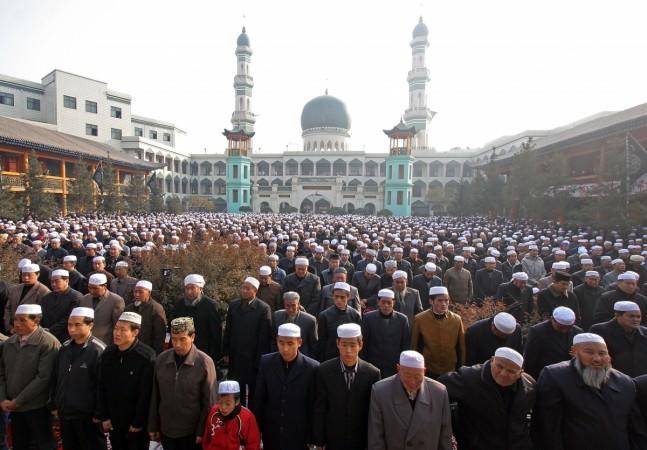
For a long time now, China is said to have detained thousands of ethnic minority Muslims in "reeducation" camps, where the treatment meted out to them has often raised quite a few eyebrows. In fact, the number of detainees is said to be about a million, but China has never spoken of these camps, until now.
The country has finally opened up on these camps, strangely calling them "legal" and "humane job-training centres." Shohrat Zakir, the chairman of Xinjiang's government and an ethnic Uighur himself, said that these camps are for the benefit of the minority group and here they are trained on several skills, which may help them in the future.
Zakir told Xinhua that these centres had courses in the Chinese language for the Uighurs and other Muslims and also inspired them to be law-abiding citizens. He also said that people living in these centres learnt several skills such as hairdressing, cosmetology, basics of e-commerce and making clothes.
Zakir also claimed that people living in these centres were not detainees, but "students" who enjoyed facilities such as air-conditioned dormitories equipped with TV and radio, good and free meals, and access to computers and even movie screenings.
"Indoor and outdoor sports venues for basketball, volleyball and table tennis have been built, along with reading rooms, computer labs, film screening rooms, as well as performance venues such as small auditoriums and open-air stages," he added.
"Xinjiang has launched a vocational education and training program according to the law," Zakir told the agency. "Its purpose is to get rid of the environment and soil that breeds terrorism and religious extremism."
While he, in a way, seemed to admit that these centres housed people against their will, Zakir claimed that they were even given "graduation certificates" after they met a few conditions. He also said that some of these "students" would be released soon and given jobs by the end of 2018.

Speaking of the programme, he also said that it was aimed at people suspected of being a threat to the nation and that China has reaped several benefits from it. He said that the country has not witnessed terror attacks in the last 21 months and the number of criminal cases has fallen.
"Public security has notably improved with religious extremism effectively contained, while people are now feeling more secure. We have laid a good foundation for completely solving the deeply-rooted problems that affect the region's long-term stability."
Zakir also called the programme an effective way to curb terrorism and extremism and something that has garnered praise from the residents of Xinjiang. Hinting that these camps are here to stay, Zakir said that the officials will continue working for all ethnic groups so that they are happy and secure and will see to it that all groups are treated equally.
While China has put across its point of how great and beneficial these centres are, not everyone appears to believe its side of the story. There have been terrifying stories of how detainees are "forced to eat pork and drink alcohol" in these centres and China's version of the story seems a bit contradictory.
What former inmates have said
In May 2018, two former detainees of these camps spoke of their ordeal to the Washington Post and the conditions at these centres seemed worst than a prison. Omir Bekali and Kayrat Samarkand had revealed that the detainees, mostly Muslims, were forced to disown the religion every hour. They were often forced to criticize their beliefs, religion, and even their loved ones. And if that wasn't enough, the detainees were asked to learn the Communist propaganda and hail and pray for leader Xi Jinping's long life.
"Those who disobeyed the rules, refused to be on duty, engaged in fights or were late for studies were placed in handcuffs and ankle cuffs for up to 12 hours," Samarkand told the daily. He also revealed that punishments included waterboarding and being strapped for long hours in a metal contraption.
Bekali ended up at the "re-education" camp when he was arrested while visiting his parents in Shanshan in the Xinjiang province in March 2017. He was reportedly interrogated for about four days, during which he wasn't allowed to sleep at all, after which he was jailed for seven months. Bekali was then sent to the "re-education" camp for 20 days where he said he was mentally and physically harassed.
When the 42-year-old refused to follow the orders, he was reportedly asked to stand at a wall for five hours on several days. When he still refused to comply, he was sent to solitary confinement and was denied food for about 24 hours.
After spending 20 days at the camp, Bekali said he became suicidal and the memories continue to haunt him. "The psychological pressure is enormous when you have to criticise yourself, denounce your thinking - your own ethnic group," he earlier told the Associated Press in tears. "I still think about it every night, until the sun rises. I can't sleep. The thoughts are with me all the time."
After Zakir spoke to Xinhua, a businessman, who had earlier been held at the centre, told the New York Times that China painted quite a picture, but these were all lies. "They're full of nonsense," he said.
"They say that these camps are to eradicate terrorism, but inside I saw lawyers, doctors, intellectuals, even officials who had nothing to do with extremism. They call these vocational training centers, but it was really a prison."

















